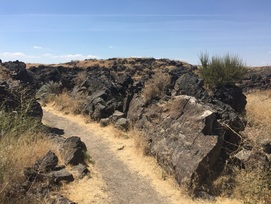
The premise of the course was that education flourishes when students are able to be physically immersed in the field of their study. I realize that is not always possible or practical, but let’s consider this for a moment before deciding how we can implement it.
As I participated in the course, it occurred to me that when I took my students on a field trip, there were less behavior problems than I typically encountered in the classroom. This is counter-intuitive in some ways. Outside the boundaries of the school site, a student could actually get in more trouble if that was the goal. However, this rarely happens.
In addition, I noticed as you probably have too, that students that are disinterested in the classroom are engaged in the field. And when we talk about what they’ve learned at the end of the year, it is the lessons they learned outside of the classroom that seem to stick the best.
Why is that? The course offered some suggestions as does current brain research. In Teaching with the Brain in Mind, Eric Jensen notes that there are predictable sources of demotivation. On his list of culprits is “the perception that class assignments or tasks are irrelevant.” Although I wouldn’t suggest that what we teach is unimportant, what matters from a motivational standpoint is whether the student thinks it matters.
He goes on to note a study on Brazilian street vendors. Adolescent street vendors were able to perform the necessary mathematical tasks of their sales with 98% accuracy. But when similar tasks were given to them in the classroom, their scores dropped to 50% (Carraher & Schliemann, 1985). Is there some disconnect that occurs within the walls the classroom that causes this drop in accuracy? Does the context of the real world provide a backdrop for catching and correcting errors in thinking and calculation?
In the last half of the 19th century, the study of natural sciences became very popular. Most university students, and many self-taught individuals, went on lengthy field studies. This became so popular that textbooks were written to support the field work. Eventually the textbooks replaced the field studies in colleges, and today, the natural sciences lack the interest and engagement they once held.
This made me wonder; is there something synthetic about our school environment that actually impedes the brain’s most effective learning modalities? More importantly, if this is true, (and research seems to support this) how do we get students out of their seats and into the field? Certainly there are logistical and financial hurdles that hinder our efforts.
At Mistletoe S.T.E.M. Institute where I teach, we depend upon parent drivers to transport our students to the filed trips we take. We explain to the parents at the start of the year that we have great opportunities planned for their children but that we can’t do it alone; we need them. When phrased this way, they are supportive. Coordinating these events is time consuming, but it is low cost and worth the investment of time.
We take our students to Lassen National Volcanic Park, Shasta Community College, California State University, Chico, and other venues. We also have a creek and pond on our campus, and students don waders to study water quality and pond life. Once we went outside and launched rockets before using trigonometry to calculate their heights.
Another option is to simply take students outside. I don’t remember one story I read in my third grade classroom. But I do remember on those hot September afternoons our teacher would walk us from our stuffy classroom. He would seat us on the grass under a sprawling valley oak and in its cool shade we read our books.
Any new environment refreshes the brain and attunes it to more focused learning. Sometimes I simply want my students to get out of their desks and stand on the left or right of the classroom to show that they agree or disagree with an idea. It’s no weeks-long field study of Yellowstone, but it beats sitting.
So what do you think? Has education gone synthetic? Can we fix it? What are your suggestions? Drop a comment in the reply section below, and in the meantime, let’s get up, get out, and get educated.
 RSS Feed
RSS Feed